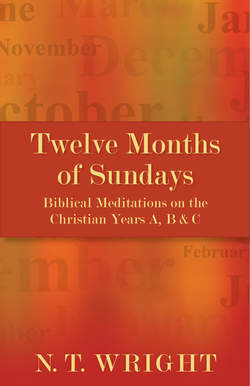Читать книгу Twelve Months of Sundays - N.T. Wright - Страница 49
На сайте Литреса книга снята с продажи.
ОглавлениеProper 8
Genesis 22.1–14
Romans 6.12–23
Matthew 10.40–42
Perhaps precisely because it is one of the darkest of all Bible stories, the tale of Abraham and Isaac on Mount Moriah has left deep imprints in Judaism and Christianity. Child sacrifice was as abhorrent to pre-Christian Jews as it is to us.
So the old questions arise: did God really tell Abraham to kill Isaac? Did Isaac really consent (as one Jewish tradition claimed), so that his readiness for martyrdom became a kind of proto-atonement? Our own day has added other questions: what would that experience do to Isaac? What did Sarah feel about it? And, once again, what is this story saying about God?
Part of the answer, as often, lies in the larger narrative. Ishmael has just been banished; is this chapter part of God’s response? Is it, in other words, not so much a sudden arbitrary demand, but rather a way of ascertaining whether Abraham is really interested in founding a pure clan of his own rather than trusting God to fulfil the promises in his own way?
Early Christian tradition offers answers from other angles, too. Abraham’s faith, says Hebrews, was a kind of resurrection-faith, believing that he would receive Isaac back from the dead (Paul, interestingly, doesn’t use that argument in Romans 4, where you might expect it). But supremely, of course, the early Christians saw that the odd, shocking thing God was calling Abraham to do was the long-range, and certainly ambiguous, signpost to the thing that God himself would do, not sparing his own dearly beloved son. ‘God will provide,’ said Abraham; Christianity began on the basis that he had, finally and fully. And, lest anyone therefore accuse God, as some are doing today, of ‘cosmic child abuse’, we must insist, with the New Testament writers, that God himself was personally and intimately present and involved at Calvary. The only full answer to the mystery of Abraham and Isaac is the far greater mystery of the Trinity.
Out of the death of ambition, pride, all that gives the word ‘self’ its unpleasant ring, there emerges freedom. Abraham is promised a superabundant blessing, a huge family (vv. 15–18). Those who obey the call of God to lay on the altar everything that belongs to the old life, the life that was crucified with Christ, discover the new freedom that points the way to ‘eternal life’. And, as Romans 8 will make clear, this eternal life consists precisely in the largescale fulfilment of the promise to Abraham: the whole world will be set free to share the freedom of the glory of God’s redeemed children.
Meanwhile, if God was in Jesus on Calvary, God is in Jesus today; and Jesus is in those who go in his name. This brief gospel reading is not primarily a command to give hospitality to those who preach the gospel; it is an encouragement to wandering missionaries, a reminder that as they go about their work God will provide once more.
